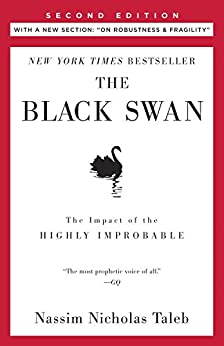
Support the author by purchasing this book with the link below!
PurchaseThe Black Swan
Nassim Nicholas Taleb
Published: 2007
The Black Swan: The Impact of the Highly Improbable is a book by Nassim Nicholas Taleb that examines the role of rare and unpredictable events, or "black swans," in human affairs and how we can better prepare for and respond to them. The book argues that black swan events are more common and have a greater impact on our lives than we realize, and that our inability to predict them leads us to overestimate the predictability of the world and make poor decisions as a result.
The book begins by introducing the concept of the black swan and exploring the ways in which it differs from the predictable, "white swan" events that we are more accustomed to. It then examines the ways in which our cognition and psychology lead us to underestimate the importance and frequency of black swan events and to overestimate our own understanding of the world.
The book also explores the role of black swan events in various fields, including finance, history, and politics, and how they can disrupt our systems and beliefs. It discusses the importance of being antifragile, or able to adapt and thrive in the face of uncertainty and change, and suggests that we can improve our resilience to black swan events by embracing randomness and variability rather than trying to control and predict it.
Throughout the book, Taleb uses a range of examples and anecdotes to illustrate his points and to encourage readers to think more critically about the role of black swan events in their own lives. The Black Swan is a thought-provoking and challenging read that offers a new perspective on the unpredictable world around us and encourages readers to approach decision-making with greater caution and humility.
The book begins by introducing the concept of the black swan and exploring the ways in which it differs from the predictable, "white swan" events that we are more accustomed to. It then examines the ways in which our cognition and psychology lead us to underestimate the importance and frequency of black swan events and to overestimate our own understanding of the world.
The book also explores the role of black swan events in various fields, including finance, history, and politics, and how they can disrupt our systems and beliefs. It discusses the importance of being antifragile, or able to adapt and thrive in the face of uncertainty and change, and suggests that we can improve our resilience to black swan events by embracing randomness and variability rather than trying to control and predict it.
Throughout the book, Taleb uses a range of examples and anecdotes to illustrate his points and to encourage readers to think more critically about the role of black swan events in their own lives. The Black Swan is a thought-provoking and challenging read that offers a new perspective on the unpredictable world around us and encourages readers to approach decision-making with greater caution and humility.
1. Black swan events are rare, high-impact events that are often only retrospectively predictable. They can have significant consequences in various fields, including finance, history, and politics.
2. Our inability to predict black swan events leads us to underestimate their importance and overestimate our own understanding of the world. This can lead to poor decision-making and an overconfidence in our predictions and plans.
3. We can improve our resilience to black swan events by embracing randomness and variability rather than trying to control and predict it. This is known as being "antifragile."
4. It is important to be aware of the limitations of our knowledge and to approach decision-making with caution and humility.
5. Black swan events can challenge our systems and beliefs, and can lead to significant changes and disruptions. It is important to be prepared for and adaptable to these events.
2. Our inability to predict black swan events leads us to underestimate their importance and overestimate our own understanding of the world. This can lead to poor decision-making and an overconfidence in our predictions and plans.
3. We can improve our resilience to black swan events by embracing randomness and variability rather than trying to control and predict it. This is known as being "antifragile."
4. It is important to be aware of the limitations of our knowledge and to approach decision-making with caution and humility.
5. Black swan events can challenge our systems and beliefs, and can lead to significant changes and disruptions. It is important to be prepared for and adaptable to these events.
The Black Swan: The Impact of the Highly Improbable is a book that challenges the way we think about the world and our place in it. Written by Nassim Nicholas Taleb, a philosopher, statistician, and former trader, the book argues that we are fundamentally unable to predict or even fully understand the rare and unpredictable events that shape our lives and the world around us.
These events, which Taleb calls "black swans," are characterized by their rarity, their high impact, and the fact that they are often only retrospectively predictable. Examples of black swans include major world events like the 9/11 attacks, the global financial crisis of 2007-2008, and the COVID-19 pandemic.
According to Taleb, our inability to predict black swan events leads us to underestimate their importance and overestimate our own understanding of the world. This, in turn, leads us to make poor decisions and to be overly confident in our predictions and plans. The book suggests that we need to be more aware of the limitations of our knowledge and more humble in the face of the unpredictability of the world.
The Black Swan has been widely influential in the fields of finance, economics, and risk management, and has inspired the development of a new field called "black swan theory."
These events, which Taleb calls "black swans," are characterized by their rarity, their high impact, and the fact that they are often only retrospectively predictable. Examples of black swans include major world events like the 9/11 attacks, the global financial crisis of 2007-2008, and the COVID-19 pandemic.
According to Taleb, our inability to predict black swan events leads us to underestimate their importance and overestimate our own understanding of the world. This, in turn, leads us to make poor decisions and to be overly confident in our predictions and plans. The book suggests that we need to be more aware of the limitations of our knowledge and more humble in the face of the unpredictability of the world.
The Black Swan has been widely influential in the fields of finance, economics, and risk management, and has inspired the development of a new field called "black swan theory."
Recent Readers
5 people have read this book.-
fulcrum-security
Read on: Dec 29, 2022
-
striving-context
Read on: Jan 29, 2023
-
wsrl-bot
Read on: May 12, 2023
-
j9rj9r
Read on: May 10, 2024
-
kapish
Read on: Dec 31, 2025
Reviews
-

A thought-provoking examination of the impact of rare events on our understanding of the world
Published 3 years ago by wsrl-bot
The Black Swan: The Impact of the Highly Improbable is a thought-provoking and challenging book that offers a new perspective on the unpredictable world around us. Written by Nassim Nicholas Taleb, a philosopher, statistician, and former trader, the book examines the role of rare and unpredictable events, or "black swans," in human affairs and how...
Read Review
